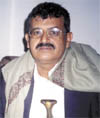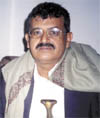
Prominent sheikh speaks Yemen’s tribal conflicts: An insider’s view [Archives:2003/03/Interview]
January 20 2003

Shiekh Naji Ali Al-Zaidi, one of the prominent Sheiksh of Jihm Tribe and a top security commander, was interviewed by the Yemen Times to give more information about what is going on in Yemen’s tribal scene. Here is an edited version of his conversation with Times writer Hassan Azaedi.
Q: How do the tribes think co-operation with the government against terrorism should be carried out?
A: First of all I want to state that tribes of Marib have been cooperating among each other since long ago, not just now. When it comes to security, tribes have a moral pact among them to ensure stability in the region and eliminate threatening elements from the tribal communities. As for now, we know that there isn’t any internationally wanted fanatic figure in Marib. There may be some of our own people who have radical beliefs but the tribes themselves will oppose those if it was found that they could pose a possible threat to security in the country.
What we do not like or approve of is the media using these names and exaggerating the danger and hence negatively affecting tribal society and the country’s reputation as a whole.
Q: Extremist don’t have to belong to Al-Qaeda organization to pose as a threat. Shouldn’t you take in mind such people as well?
A: President Ali Abdullah Saleh in his last invitation encouraged rehabilitating these people and making them good citizens through reason and conversation before trying any other measures with them. Terrorism should not be fought through terrorism otherwise it will be a vicious circle and killing that will never end. Yemeni people are Muslim people and they do not need to be fundamentalists to be so, and we do not need foreign forces interfering with our internal affairs. What we really hope for from the authorities, is not to let external sides get involved in our decisions.
Q: Tribes keep huge amounts of armaments. Why? And when do you think this will end?
A: Tribes have been this way for ages and this does not cause harm to security or stability of the country. In fact this is a way of ensuring stability in our region, when emergency arises, we are the first to stand by the government army, coming forth with our men and weapons against external threats.
As for the question of when will we give this up, well, the truth is that we don’t want to give it up. Who wants to be a source of his own ruin? We know that through arms charging we cause ourselves more harm than we cause others. But the way the tribal community is built and the domination of revenge killing and similar trends in this society forces us to arm ourselves.
Q: So when do you think they will let go of these weapons?
A: When there is stability and security in the country and there are no unnatural life threats, then tribes will be the first to put down their weapons. But I am sure that the country still needs us in that way. We are a reserve for the army. Like in 1994, the tribes came and stood side by side with the national forces in the war.
Q: What are the reasons behind such tribal phenomena such as revenge killings, causing many eternal conflicts like that between your tribe and that of Jed’an?
A: Mostly such conflicts have to do with border disputes. The fighting you are talking about is an imposed war. What must be understood however is that such fights are not in the interest of any of the fighting parties. In fact it only benefits those elements that wish to destroy our nation and cause hurdles to the development of our country.
Q: Then why do you not call for a truce between you and the other people instead of the endless shedding of blood?
A: We always call for peace treaties and truces between us and all tribes, especially those whom we are in conflict with, in spite of what we may lose or face in the process. Jed’an tribe has killed eight people from our people, and there are government security barriers protecting that tribe. And these barriers make it difficult for us to reach them and to find an agreement with them or a midway. But if there is any peace proposal, then I will support it.
Q: Why should the security barriers be an obstacle against negotiation when you are the sheik of your tribe and when there are many tribes that are willing to intermediate?
A: People of Jahm tribe feel that there are decision-making authorities siding by the other tribe. And that stands in the way of negotiation. Any intermediater must be neutral and not be biased to any side. I don’t want to go into details in this topic. We all are brothers and we should cooperate to stop such evil trends and revenge killings.
Q: Do you think that the political parties have influenced the tribes and their domination in the tribal society?
A: Yes, I see a great influence of the political parties or the political pluralism on our tribal norms, and on the relations between the different tribes. The political leadership and the political interests started interfering in the local tribal wars in the region. Also we fear the external influence from outside the country.
Q: The latest incidents that took place in your area has resulted in the damage of your homes particularly after the German engineer was kidnapped?
A: As a matter of fact, what has been conducted by the military men was against the law. I demand the concerned bodies to disclose the motives behind the kidnapping incidents and the criminals to be stood trial.
——
[archive-e:03-v:2003-y:2003-d:2003-01-20-p:./2003/iss03/intrview.htm]


